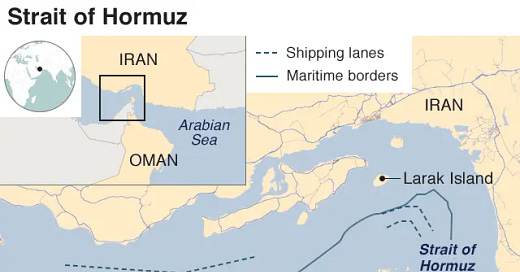Publisher’s note: To make upgrading to a paid subscription more attractive to those of you who would like to support this newsletter, I’ve lowered the price by 40%, from $50 annually to $30, and from $5 monthly to just $3. Those prices will hold for as long as you’re a paid subscriber. ~MSW
Last Saturday, America decided to go to war with Iran. While there is much to debate in terms of the prudence of entering into yet another Middle East conflict, this post will focus on the attack's impact on the commodities markets, particularly on crude oil.
It is important to understand that the action taken by the U.S. on behalf of Israel constitutes a geopolitical event that will result in increased market volatility and increased potential for supply disruptions even if Iran chooses not to retaliate.
When coupled with the disruption caused by tariff uncertainty, the attack will almost certainly hurt global economic conditions. The most immediate reaction thus far is in the markets, as evidenced by an increase in the risk premium on crude oil.
This term refers to the extra return that investors demand for taking on the additional risk involved with an investment, and it is influenced by several factors. In this instance, the most significant factors are heightened geopolitical risks and a shock to the price of oil.
Much of what happens going forward depends on how Iran responds. Any number of responses remain on the table. However, since the U.S. attacks, the Iranian parliament voted to close the Strait of Hormuz, an oceanic waterway connecting the Persian Gulf to the Gulf of Oman.
In the past 48 hours, the Strait of Hormuz has been name-dropped by news anchors turned Middle East experts, but the reasons for its sudden significance are rarely explained.
Ironically, Madīq Bab Al Salam, the strait’s name in Arabic, means “the door of peace.” Iran is located on the strait’s northernmost coast, and at its southern end is the Musandam Peninsula, shared by both the United Arab Emirates and the Musandam Governorate, an Omani enclave.
The Strait of Hormuz matters now because it separates Iran from the Arabian Peninsula and is the only sea route from the Persian Gulf to the Arabian Sea. It is a marine route through which all traffic both to and from the oil-rich nations of the gulf must pass.
Tons of commodities pass through the Strait annually, however, energy-related commodities are its most important cargo. Roughly twenty percent of the world’s seaborne crude oil and about a third of all liquefied natural gas is transported by way of the Strait of Hormuz.
Because of the Strait’s strategic and economic importance, it is the most significant marine choke point on the planet. Anything that disrupts the flow of commodities through the Strait—especially oil—directly affects the financial markets, and the global economy.
Notably, China buys as much as 90% of all Iranian oil exports. Given that its government is simultaneously involved in tariff negotiations with the U.S., the China is caught between the proverbial rock and a hard place:
Data from analytics firm Kpler put China's Iranian oil imports at 1.71 million bpd in March, up 20% from 1.43 million bpd [barrels per day] in February and a five-month high, while two traders who track Iranian flows into China estimated March imports at 1.67 million bpd and 1.8 million bpd, respectively.
China, which opposes unilateral sanctions, buys some 90% of Iran's oil exports, which are mostly trans-shipped in waters off Malaysia and Singapore and rebranded as Malaysian, a trade that has been boosted as more vessels drawn by high fees replaced those under U.S. sanctions, traders and analysts have said. Iranian oil accounted for 16% of China's March seaborne crude oil imports, Kpler data showed.
Over the past several decades, the Strait has been the scene of numerous conflicts. During the so-called “tanker wars” of the eighties, an offshoot of the broader war between Iraq and Iran, hundreds of merchant vessels were attacked by the two nations. All told, the conflict resulted in over 30 million tons of cargo damage and the deaths of more than 100 sailors.
Overnight, prices for U.S. crude reached their highest levels since January. Although prices have fallen to about $74 a barrel, the price of oil could exceed $100 per barrel should Iran block the Strait of Hormuz for an extended period.






Thanks for posting some geography. I used to insist that my History students consider things like geographical advantages and disadvantages of certain nations, islands, and etcetera. Personally, I will never live in a landlocked state in the USA or elsewhere.
And what Felon 47 did to Iran was one of my biggest worries…It was one of my worries to the point where I don’t particularly want any Black woman to run for president again for a very long time. Why?
I don’t want her to drop dead from the exhaustion of having to clean up behind the mess being created right now.
Thanks Marlon for this informative piece.